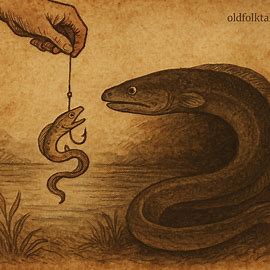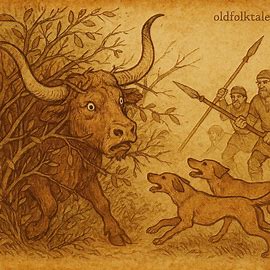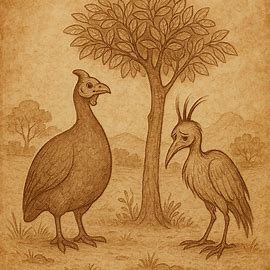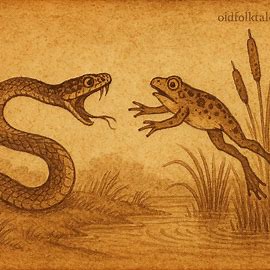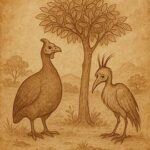Long ago, in the watery depths where rivers wound their way through the land of the Antambahoaka people, there lived two eels, one great and strong, the other small and restless. The river was alive with reeds that bent and whispered with the wind, and fish darted in schools beneath the shimmering surface. In this flowing world of shadows and light, the little eel first set her eyes upon the big eel, whose body glided through the currents with effortless power.
The little eel could not hide her awe. “How did you grow so large?” she asked, her voice filled with curiosity and a hint of envy.
The big eel, wise from years of survival, paused and answered in a slow, steady tone. “I have lived long because I have learned caution. I never eat meat wrapped around an iron hook. I never enter the cold traps where the body stiffens and freezes. And I always keep far away from the fishermen’s fires at night, for their spears wait in the shadows. If you wish to grow strong and live long, follow my path, and you too will survive.”
The little eel listened, nodding politely. “You are right,” she said aloud, but in her heart she doubted. To her, the world seemed wide, and dangers seemed distant. She believed herself clever enough to escape whatever came.
Not long after, the little eel’s patience was tested. She saw a small piece of meat dangling invitingly in the water. From it glinted a tiny shard of iron, a fisherman’s hook. She remembered the big eel’s warning, yet she scoffed. “This tiny thing cannot possibly kill me,” she thought. Driven by hunger and overconfidence, she swallowed the bait. At once the hook lodged fast in her mouth, tearing her flesh. Panic seized her, and she writhed in pain.
Her cries carried through the water until the big eel, gliding nearby, heard her. He swam close and said: “If you want a chance to live, pretend to be dead. Do not struggle. Perhaps the fisherman will be fooled.”
READ THIS: Frogs and the Heron: A Madagascan Folktale That Teaches Lessons on Contentment and Leadership
The little eel obeyed, going limp though her mouth throbbed with pain. Soon the fisherman pulled up his line, smiling at his catch. Yet, seeing no signs of life in the eel, he assumed it was already dead. He tossed her carelessly onto the riverbank. The moment his back was turned, the little eel twisted her body with all her strength and slipped back into the river, vanishing into the depths.
Shaken but alive, she swore she would be careful. Yet in time her fear faded. Another day, while searching for food, she entered a woven trap hidden among the reeds. Too late she realized the danger. She thrashed against the walls but could not escape. Then she remembered her trick and went still, pretending to be lifeless once again.
When the fisherman came to empty his trap, he found her lying motionless inside. Believing her spoiled or dead, he tossed her aside. With swift instinct, the little eel wriggled free and slid back into the safety of the water. Triumph filled her heart. “I am cleverer than all dangers,” she boasted to herself. “This trick will always save me.”
But wisdom does not linger long in the hearts of the proud.
One night, under the glow of the moon, fishermen came with torches. Their fires flickered on the water, casting long shadows and luring creatures closer. Entranced by the strange glow, the little eel swam toward the light. The big eel’s warning echoed faintly in her memory, but she brushed it aside. “I have outsmarted hooks and traps. Surely, I can outsmart fire as well.”
But fire brings no mercy. As she drew near, a fisherman thrust his spear into the water. It pierced her body in one sharp strike. This time no trick could save her. The little eel’s story ended beneath the blaze of the torchlight, while the river swallowed her silence.
The big eel swam on, saddened but unsurprised. He had spoken the truth, but wisdom ignored is wisdom lost.
Moral Lesson
This folktale teaches that obedience to wise counsel ensures safety, while arrogance leads to ruin. The little eel twice escaped danger by chance, but her repeated disregard for the big eel’s guidance ultimately brought her downfall. Wisdom is not meant to be tested endlessly; it is meant to be followed. The story reminds us that pride and recklessness blind us to real danger, while patience and humility preserve life.
Knowledge Check
Why did the little eel approach the big eel?
To ask how he had grown so large and strong.
What advice did the big eel give to ensure survival?
Avoid hooks, avoid cold traps, and stay far from fishermen’s fires.
How did the little eel escape after swallowing the hook?
She pretended to be dead, tricking the fisherman into discarding her.
What mistake did the little eel repeat in the trap?
She entered it despite warnings, but escaped again by feigning death.
Why did the little eel finally die?
She ignored the advice about fire, swam toward torchlight, and was speared.
From which culture does this folktale originate?
It is an Antambahoaka folktale from Madagascar.
Source: Antambahoaka folktale, Madagascar.
